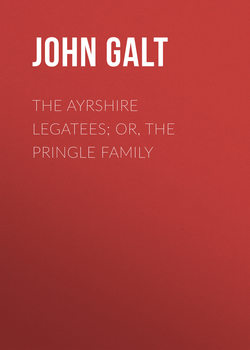Читать книгу The Ayrshire Legatees; Or, The Pringle Family - John Galt - Страница 6
CHAPTER II – THE VOYAGE
LETTER IV
ОглавлениеAndrew Pringle, Esq., Advocate, to the Rev. Charles Snodgrass
London.
My dear Friend – We have at last reached London, after a stormy passage of seven days. The accommodation in the smacks looks extremely inviting in port, and in fine weather, I doubt not, is comfortable, even at sea; but in February, and in such visitations of the powers of the air as we have endured, a balloon must be a far better vehicle than all the vessels that have been constructed for passengers since the time of Noah. In the first place, the waves of the atmosphere cannot be so dangerous as those of the ocean, being but “thin air”; and I am sure they are not so disagreeable; then the speed of the balloon is so much greater, – and it would puzzle Professor Leslie to demonstrate that its motions are more unsteady; besides, who ever heard of sea-sickness in a balloon? the consideration of which alone would, to any reasonable person actually suffering under the pains of that calamity, be deemed more than an equivalent for all the little fractional difference of danger between the two modes of travelling. I shall henceforth regard it as a fine characteristic trait of our national prudence, that, in their journies to France and Flanders, the Scottish witches always went by air on broom-sticks and benweeds, instead of venturing by water in sieves, like those of England. But the English are under the influence of a maritime genius.
When we had got as far up the Thames as Gravesend, the wind and tide came against us, so that the vessel was obliged to anchor, and I availed myself of the circumstance, to induce the family to disembark and go to London by land; and I esteem it a fortunate circumstance that we did so, the day, for the season, being uncommonly fine. After we had taken some refreshment, I procured places in a stage-coach for my mother and sister, and, with the Doctor, mounted myself on the outside. My father’s old-fashioned notions boggled a little at first to this arrangement, which he thought somewhat derogatory to his ministerial dignity; but his scruples were in the end overruled.
The country in this season is, of course, seen to disadvantage, but still it exhibits beauty enough to convince us what England must be when in leaf. The old gentleman’s admiration of the increasing signs of what he called civilisation, as we approached London, became quite eloquent; but the first view of the city from Blackheath (which, by the bye, is a fine common, surrounded with villas and handsome houses) overpowered his faculties, and I shall never forget the impression it made on myself. The sun was declined towards the horizon; vast masses of dark low-hung clouds were mingled with the smoky canopy, and the dome of St. Paul’s, like the enormous idol of some terrible deity, throned amidst the smoke of sacrifices and magnificence, darkness, and mystery, presented altogether an object of vast sublimity. I felt touched with reverence, as if I was indeed approaching the city of the human powers.
The distant view of Edinburgh is picturesque and romantic, but it affects a lower class of our associations. It is, compared to that of London, what the poem of the Seasons is with respect to Paradise Lost– the castellated descriptions of Walter Scott to the Darkness of Byron – the Sabbath of Grahame to the Robbers of Schiller. In the approach to Edinburgh, leisure and cheerfulness are on the road; large spaces of rural and pastoral nature are spread openly around, and mountains, and seas, and headlands, and vessels passing beyond them, going like those that die, we know not whither, while the sun is bright on their sails, and hope with them; but, in coming to this Babylon, there is an eager haste and a hurrying on from all quarters, towards that stupendous pile of gloom, through which no eye can penetrate; an unceasing sound, like the enginery of an earthquake at work, rolls from the heart of that profound and indefinable obscurity – sometimes a faint and yellow beam of the sun strikes here and there on the vast expanse of edifices; and churches, and holy asylums, are dimly seen lifting up their countless steeples and spires, like so many lightning rods to avert the wrath of Heaven.
The entrance to Edinburgh also awakens feelings of a more pleasing character. The rugged veteran aspect of the Old Town is agreeably contrasted with the bright smooth forehead of the New, and there is not such an overwhelming torrent of animal life, as to make you pause before venturing to stem it; the noises are not so deafening, and the occasional sound of a ballad-singer, or a Highland piper, varies and enriches the discords; but here, a multitudinous assemblage of harsh alarms, of selfish contentions, and of furious carriages, driven by a fierce and insolent race, shatter the very hearing, till you partake of the activity with which all seem as much possessed as if a general apprehension prevailed, that the great clock of Time would strike the doom-hour before their tasks were done. But I must stop, for the postman with his bell, like the betherel of some ancient “borough’s town” summoning to a burial, is in the street, and warns me to conclude. – Yours,
Andrew Pringle.
